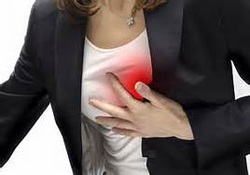Author:
|
Back to Blog
Heart Attack Symptoms in Women3/18/2014  We’ve all seen the movie scenes where a man gasps, clutches his chest and falls to the ground. In reality, a heart attack victim could easily be a woman, and the scene may not be that dramatic. “Although men and women can experience chest pressure that feels like an elephant sitting across the chest, women can experience a heart attack without chest pressure, ” said Nieca Goldberg, M.D., medical director for the Joan H. Tisch Center for Women's Health at NYU’s Langone Medical Center and an American Heart Association volunteer. “Instead they may experience shortness of breath, pressure or pain in the lower chest or upper abdomen, dizziness, lightheadedness or fainting, upper back pressure or extreme fatigue.” Even when the signs are subtle, the consequences can be deadly, especially if the victim doesn’t get help right away. ‘I thought I had the flu’ Even though heart disease is the No. 1 killer of women, women often chalk up the symptoms to less life-threatening conditions like acid reflux, the flu or normal aging. “They do this because they are scared and because they put their families first,” Goldberg said. “There are still many women who are shocked that they could be having a heart attack.” A heart attack strikes someone about every 34 seconds. It occurs when the blood flow that brings oxygen to the heart muscle is severely reduced or cut off completely. This happens because the arteries that supply the heart with blood can slowly become thicker and harder from a buildup of fat, cholesterol and other substances (plaque). Watch an animation of a heart attack. Many women think the signs of a heart attack are unmistakable — the image of the elephant comes to mind — but in fact they can be subtler and sometimes confusing. You could feel so short of breath, “as though you ran a marathon, but you haven't made a move,” Goldberg said. Some women experiencing a heart attack describe upper back pressure that feels like squeezing or a rope being tied around them, Goldberg said. Dizziness, lightheadedness or actually fainting are other symptoms to look for. “Many women I see take an aspirin if they think they are having a heart attack and never call 9-1-1,” Goldberg said. “But if they think about taking an aspirin for their heart attack, they should also call 9-1-1.” Take care of yourself Heart disease is preventable. Here are Goldberg’s top tips:
To take a class give us a call at (503_
0 Comments
Read More
Your comment will be posted after it is approved.
Leave a Reply. |

 RSS Feed
RSS Feed